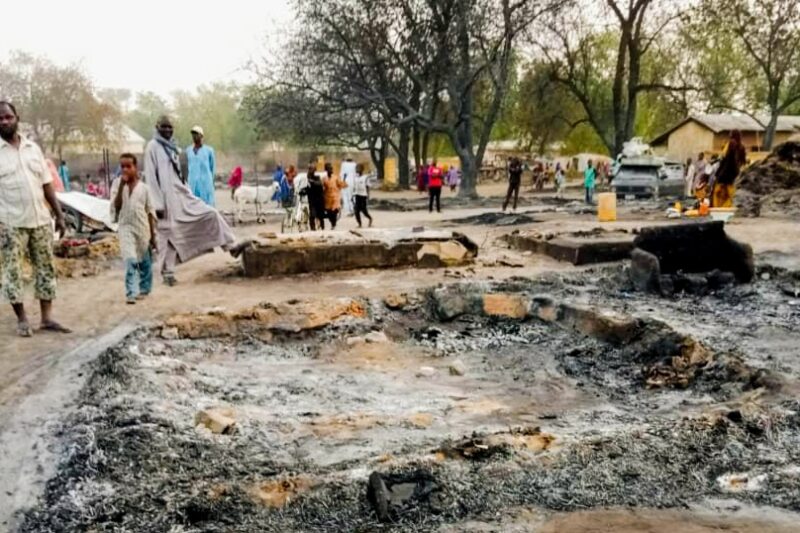Displaced people who lost everything they owned in fires that raged through their camps say the Borno State government has forgotten them.
“We’re homeless, hungry and hopeless – and it seems as if the Borno State government has forgotten us.”
No sooner had Ramadan begun on Sunday, March 10, than fires broke out in several internally displaced persons’ camps across Borno State, the worst being at the Fariya Garkin Block and Muna Kumburi camps, where four children died and thousands of houses and tents were burnt down.
Malum Yaisami, the chairperson of Muna Kumburi camp in Maiduguri, told RNI that the devastating fire that broke out on Tuesday, March 12, had left residents with nothing but the clothes they were wearing.
“They have no shelters or clothes and all their possessions were burnt to a cinder. They are hungry and there is no clean drinking water.
“Everyone is suffering. The humanitarian crisis in the camp is worsening as each day passes.
“With temperatures ranging from the low to mid 40s, just about everyone – particularly because it is Ramadan now and we are fasting – is suffering from dehydration and fatigue. They are weak and some hardly move because they simply do not have any energy.”
Yaisami said elderly people, women and children were falling sick because of the critical living conditions.
“The people are homeless and there is nowhere for them to shelter from the scorching sun. They fast from sunrise to sunset and then they do not have anything substantial to eat when it is time to break the fast.
“There is concern that some of the elderly men and women and the babies could die if they do not receive help soon.
“It’s as if the Borno State government has forgotten us. No one in authority has shown any concern. We have not received any humanitarian aid to cushion the hardships we are going through.
“If the government will not help us, we are begging non-governmental organisations [NGOs], humanitarian agencies and philanthropists to support us by providing food and other essentials.
“Most people are sleeping out in the open, where insects are biting them. They do not have mats or mattresses – their possessions were burnt to ashes. At night you hear women and children crying from hunger.”
Falmata Modu Aji, who lost everything in the fire, said: “It is challenging to live like this. Fasting and the heatwave make it even more difficult. We spend our days trying to find shade to shield us from the blazing sun and at night it is so uncomfortable that we cannot sleep properly. There are insects everywhere.
“We do not have anything substantial to eat when we break the fast. Even clean water is hard to find. The little children are really suffering. They are starving. We already lost two children in the fire. More could die from hunger.
“We feel hopeless because we have been forgotten by our government.”
Babagana Mustapha, whose little girl died in the fire, said everything he owned was destroyed.
“The day the fire broke out was the worst day of my life. I lost my little girl and it is hard to recover from such a tragedy.”
He said his hut was burnt down and his sewing machine and two generators were destroyed.
“Right now, I am left with nothing. I am a tailor but I cannot do any business because I lost everything. These days everything costs a fortune. I cannot even provide a decent meal for my family when we break the fast. Most of us rely on handouts to survive.”
Alhaji Jidda, the chairperson of Fariya Garkin Block in the Jere Local Government Area, said more than 1,500 huts and tents were burnt to ashes in the inferno that ripped through the camp on Monday, March 18.
“Since the inferno gutted the Fariya Garkin block we have not heard anything from the government. There have been no interventions or assistance. It’s as if we don’t exist.
“Two little girls died in the fire. Now we are scared that more children could die – but this time it will be hunger that kills them. Most of us do not have a proper meal when we break the fast. Elderly people are getting frailer and weaker.
“I am begging the government to provide humanitarian assistance to cushion our hardship in this holy month of Ramadan.”
SHETTIMA LAWAN MONGUNO








